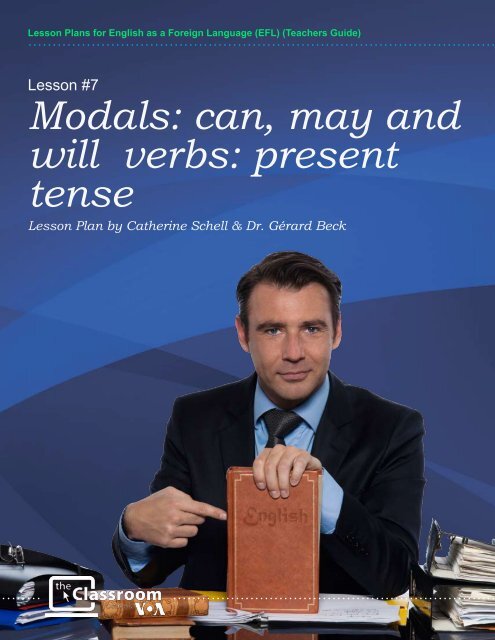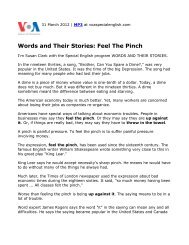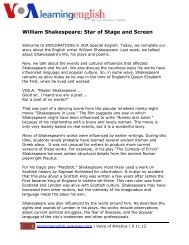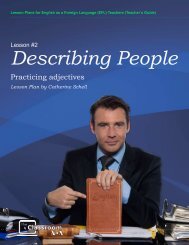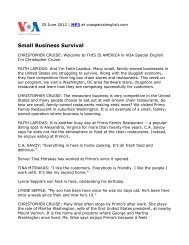Modals: can, may and will verbs: present tense - VOA
Modals: can, may and will verbs: present tense - VOA
Modals: can, may and will verbs: present tense - VOA
Create successful ePaper yourself
Turn your PDF publications into a flip-book with our unique Google optimized e-Paper software.
Lesson Plans for English as a Foreign Language (EFL) (Teachers Guide)<br />
Lesson #7<br />
<strong>Modals</strong>: <strong>can</strong>, <strong>may</strong> <strong>and</strong><br />
<strong>will</strong> <strong>verbs</strong>: <strong>present</strong><br />
<strong>tense</strong><br />
Lesson Plan by Catherine Schell & Dr. Gérard Beck
On Facebook: <strong>VOA</strong> LearningEnglish<br />
Learn English with the English Doctor <strong>and</strong><br />
the English Traveler at www.voanews.com/theclassroom<br />
Lesson Plans for English as a Foreign Language (EFL) Teachers Guide<br />
<strong>Modals</strong>: <strong>can</strong>, <strong>may</strong> <strong>and</strong> <strong>will</strong><br />
The goals of this week’s Classroom lesson (#8) are to learn more about the modals <strong>may</strong>, <strong>can</strong>, <strong>will</strong> <strong>and</strong> shall. In this lesson,<br />
you <strong>will</strong> learn how to recognize <strong>and</strong> use the different forms of <strong>may</strong>, <strong>can</strong>, <strong>will</strong> <strong>and</strong> shall in the <strong>present</strong> <strong>and</strong> past <strong>tense</strong>s. You<br />
<strong>will</strong> be able to master some of the most recurrent words in the English language through the following texts, grammatical<br />
explanations, <strong>and</strong> exercises within <strong>VOA</strong>’s The Classroom<br />
WARM-UP:<br />
Look at this English nursery rhyme:<br />
Star light, star bright<br />
The first star I see tonight;<br />
I wish I <strong>may</strong>, I wish I might,<br />
Have the wish I wish tonight<br />
The words in white are modals. <strong>Modals</strong> modify the statement in a<br />
certain way. Can you tell how? Take a look at the nursery rhymes<br />
in some of the previous lessons. Can you find more examples of<br />
modals?<br />
Let’s look for more examples of modals in this <strong>VOA</strong> Learning English article on health.<br />
Voice of America’s EFL<br />
Teaching Community<br />
Lesson 7: Page 2<br />
06.20.11
On Facebook: <strong>VOA</strong> LearningEnglish<br />
Learn English with the English Doctor <strong>and</strong><br />
the English Traveler at www.voanews.com/theclassroom<br />
Lesson Plans for English as a Foreign Language (EFL) Teachers Guide<br />
TEXTS<br />
<strong>Modals</strong>: <strong>can</strong>, <strong>may</strong> <strong>and</strong> <strong>will</strong><br />
The following text is an edited excerpt from a <strong>VOA</strong> Learning English article on health:<br />
http://www.voanews.com/learningenglish/home/health/An-Image-Problem-for-a-Food-That-Could-Save-Afri<strong>can</strong>-Lives-112822614.html<br />
An ‘Image Problem’ for a Food That Could Save Afri<strong>can</strong> Lives<br />
People who do not get enough vitamin A in their diet <strong>may</strong> develop night blindness. But in the developing<br />
world a lack of vitamin A causes much more serious harm to children. The World Health Organization links<br />
vitamin A deficiency to as many as two hundred fifty thous<strong>and</strong> child deaths every year.<br />
One excellent source of vitamin A is found in sweet potatoes with orange flesh. Orange sweet potatoes<br />
contain high levels of beta-carotene, which the body changes into vitamin A. Experts say orange sweet potatoes<br />
specially bred for growing conditions in Africa could help solve the lack of vitamin A there.<br />
But, first, more people <strong>will</strong> need to be persuaded to eat them. Jan Low with the International Potato Center,<br />
a research organization, says the sweet potato needs a better image in Africa. Ms. Low explains that sweet<br />
potatoes are mainly grown by poor women to feed their families in case another crop fails. The sweet potatoes<br />
commonly grown in Africa have white or yellow flesh. But, more importantly, they are low in vitamin A.<br />
Dan Gustafson heads the Washington office of the United Nations Food <strong>and</strong> Agriculture Organization.<br />
He points to efforts in the past to increase the popularity of other nutritious crops. He says most of these efforts<br />
failed because organizers of the campaigns did not consider what people wanted to eat. But Mr. Gustafson sees<br />
a better chance for the efforts to increase the popularity of the orange sweet potato in Africa. For one thing,<br />
except for the color, the vegetable is similar to what people already use.<br />
According to Dan Gustafson “it is because you have got advertising <strong>and</strong> you have got a difference that is<br />
not radical, that […] it <strong>will</strong> work.”<br />
Voice of America’s EFL<br />
Teaching Community<br />
Lesson 7: Page 3<br />
06.20.11
LESSON<br />
Expression of modality: MAY, CAN, <strong>and</strong> WILL<br />
On Facebook: <strong>VOA</strong> LearningEnglish<br />
Learn English with the English Doctor <strong>and</strong><br />
the English Traveler at www.voanews.com/theclassroom<br />
Lesson Plans for English as a Foreign Language (EFL) Teachers Guide<br />
May, <strong>can</strong>, <strong>and</strong> <strong>will</strong> are words that express modality, <strong>and</strong> are called modals. Modality is the expression of<br />
subjectivity. Any utterance or statement <strong>can</strong> be given different levels of modality according to the modal that is<br />
used.<br />
Examples: I swim.<br />
no modality => neutral statement<br />
Work on the Text<br />
In order to underst<strong>and</strong> how modals modify statements in which they appear, take each individual sentence<br />
from the text that contains a modal:<br />
Are the sentences grammatically correct when you do so?<br />
Yes, because the modal only affects the relationship between the subject <strong>and</strong> the verb. On some occasions, however,<br />
some adjustments need to be made when you take out the modal (agreement between the subject <strong>and</strong> the<br />
verb)<br />
How does the meaning change when you switch from <strong>may</strong> to could or <strong>will</strong>?<br />
The probability of the event occurring changes.<br />
Are they sentences that do not contain a modal which you could rephrase using a modal?<br />
Yes, many of them. For instance:<br />
- “But in the developing world a lack of vitamin A causes much more serious harm to children.”<br />
=> But in the developing world a lack of vitamin A <strong>may</strong>/<strong>can</strong> cause much more serious harm to children.<br />
- “One excellent source of vitamin A is found in sweet potatoes with orange flesh.”<br />
=> One excellent source of vitamin A <strong>can</strong> be found in sweet potatoes with orange flesh.<br />
I <strong>can</strong> swim.<br />
modal <strong>can</strong>: the speaker (I) expresses his physical capacity to swim.<br />
I <strong>may</strong> swim.<br />
modal <strong>may</strong>: the speaker (I) expresses a probability on the realization of the action<br />
“I/swim” => it is likely.<br />
I <strong>will</strong> swim.<br />
modal <strong>will</strong>: the speaker (I) expresses a very strong probability on the<br />
realization of the action “I/swim” => it is almost certain.<br />
Voice of America’s EFL<br />
Teaching Community<br />
Lesson 7: Page 4<br />
06.20.11
LESSON (cont.)<br />
This table reflects different conjugations <strong>and</strong> uses of the modals:<br />
On Facebook: <strong>VOA</strong> LearningEnglish<br />
Learn English with the English Doctor <strong>and</strong><br />
the English Traveler at www.voanews.com/theclassroom<br />
Lesson Plans for English as a Foreign Language (EFL) Teachers Guide<br />
Note: although it is very common among teachers of English to <strong>present</strong> <strong>will</strong> as an expression of the<br />
future, it is completely erroneous. It is a modal that expresses, among other things, a probability. Other<br />
modals that share the same characteristic are <strong>may</strong>, might <strong>and</strong> would.<br />
It is of utmost importance that you underst<strong>and</strong> that the ‘<strong>tense</strong>s’ shown in the table are not correlated to<br />
the time of the action in statements. For instance, <strong>may</strong> <strong>and</strong> might <strong>can</strong> be used in the following sentence;<br />
the only difference in meaning is that the probability of the event is greatly reduced when you use<br />
might:<br />
I <strong>may</strong>/might go to the movies today if I have time.<br />
When you use the past form of a modal (might, could, would) the probability or physical capacity that<br />
is expressed by the modal is greatly reduced from its use in the <strong>present</strong>. As a consequence, could <strong>and</strong><br />
would are seen as being more polite in questions than their counterpart <strong>can</strong> <strong>and</strong> <strong>will</strong>:<br />
Can Could you tell me where the nearest metro is please?<br />
Will Would you lend me two dollars to buy a coffee please?<br />
Using the modals with the negation is very easy. Just add not after the modal. Pay special attention to<br />
<strong>can</strong>, however: you <strong>may</strong> write it <strong>can</strong>’t (informal) or <strong>can</strong>not (formal). Will is also quite specific: it is<br />
written won’t (informal) or <strong>will</strong> not (formal).<br />
Voice of America’s EFL<br />
Teaching Community<br />
Lesson 7: Page 5<br />
06.20.11
Exercises<br />
On Facebook: <strong>VOA</strong> LearningEnglish<br />
Learn English with the English Doctor <strong>and</strong><br />
the English Traveler at www.voanews.com/theclassroom<br />
Lesson Plans for English as a Foreign Language (EFL) Teachers Guide<br />
1. Choose the correct modal according to the context (more than one option is possible):<br />
a) Can/could/<strong>will</strong>/would you come <strong>and</strong> pick me up tonight? No, unfortunately. My car is at the mechanic.<br />
b) She <strong>may</strong>/might/could travel to Asia in the spring, but she is not sure.<br />
c) Can you play the piano? I <strong>can</strong>’t, but I <strong>can</strong> play the violin.<br />
d) What would you buy if you win the lottery? I would buy a house, but I could save or invest the money.<br />
e) Tomorrow we <strong>will</strong>/<strong>may</strong>/might/<strong>can</strong>/could go shopping. Will/would you come with us?<br />
2. Find the modals that would not be appropriate in the following text:<br />
In the U.S.A., you <strong>can</strong> start driving a car when you are 16 <strong>and</strong> you <strong>can</strong> vote when you are 18. When you are 21,<br />
you <strong>can</strong>/<strong>may</strong> buy <strong>and</strong> drink alcohol but watch out! The law is very strict <strong>and</strong> if you drink <strong>and</strong> drive, you <strong>will</strong> go<br />
to jail if the police pull you over. Most people have a designated driver when they go out. They <strong>may</strong>/<strong>can</strong> drink,<br />
but the designated driver <strong>can</strong>not/<strong>can</strong>’t drink <strong>and</strong> stays sober to drive his or her friends safely home.<br />
3. Rephrase the following sentences using the appropriate modal:<br />
Example: It is possible that he comes with us tonight.<br />
=> He <strong>may</strong> / might come with us tonight.<br />
a) There is a 100% chance of rain tomorrow.<br />
It <strong>will</strong> rain tomorrow.<br />
b) It is impossible for them to travel to New York City for the holidays.<br />
They <strong>can</strong>’t travel to New York City for the holidays.<br />
c) Please, drive carefully tonight, ok?<br />
Would you drive carefully tonight?<br />
d) It is very unlikely that we get a loan from the bank, but it’s possible.<br />
We might not get a loan from the bank.<br />
e) I don’t want to miss Eric Clapton’s concert because I’m a fan.<br />
I <strong>can</strong>’t/won’t miss Eric Clapton’s concert because I’m a fan.<br />
4. FINDING MODALS: Some students <strong>may</strong> say that modals are difficult to find. Yet, we <strong>can</strong> find modals<br />
in many instances throughout our daily routine. Think of when you ask someone for directions:<br />
Hi Walter, sorry to bother you at work. Can you tell me how do I get to the beach? I’m<br />
still learning the roads in this city.<br />
Voice of America’s EFL<br />
Teaching Community<br />
Lesson 7: Page 6<br />
06.20.11
Exercises (cont.)<br />
Wind-down<br />
On Facebook: <strong>VOA</strong> LearningEnglish<br />
Learn English with the English Doctor <strong>and</strong><br />
the English Traveler at www.voanews.com/theclassroom<br />
Lesson Plans for English as a Foreign Language (EFL) Teachers Guide<br />
No problem Steve. You <strong>can</strong> go down the interstate. Or you could follow the main road<br />
out of town, but you <strong>will</strong> run into a dead end, so take the last exit if you go by interstate.<br />
Hi Claudia! I’m going to the beach this afternoon. I just got directions. Would you like to<br />
come with me?<br />
Hey Steve! That sounds great! But <strong>can</strong> we go after three p.m. because I am jogging right<br />
now? I <strong>will</strong> ring you when I am back at the dorm <strong>and</strong> you <strong>can</strong> pick me up. Looking forward<br />
to this afternoon! Bye!<br />
Continue the conversation between Claudia <strong>and</strong> Steve’s day trip to the beach using modals <strong>and</strong> the<br />
following situations.<br />
Claudia asks Steve what type of food she should bring.<br />
Can I bring lunch? Or <strong>can</strong> we stop along the way? What would you like?<br />
On the way to the beach it starts raining. Decide what Steve <strong>and</strong> Claudia should do.<br />
Would you like to go to a movie instead? It <strong>will</strong> be to late drive back.<br />
We could chance it <strong>and</strong> wait until the rain stops. I think this is just a brief spring rainstorm.<br />
For a <strong>VOA</strong> Student Union Blog post on the ‘Ameri<strong>can</strong> Way’ <strong>and</strong> the ‘Can do’ attitude:<br />
http://blogs.voanews.com/student-union/2010/11/03/the-ameri<strong>can</strong>-way/#more-909<br />
Article in ‘Wind down’: Student Union Blog (<strong>VOA</strong>)<br />
Picture (warm-up): Stockvault.net<br />
Voice of America’s EFL<br />
Teaching Community<br />
Lesson 7: Page 7<br />
06.20.11


